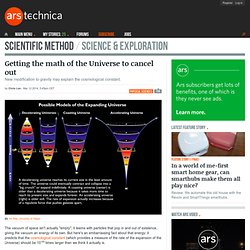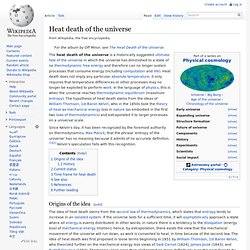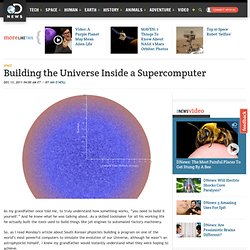

Stanford Professor Andrei Linde celebrates physics breakthrough. Getting the math of the Universe to cancel out. The vacuum of space isn't actually "empty"; it teems with particles that pop in and out of existence, giving the vacuum an energy of its own.

But here's an embarrassing fact about that energy: it predicts that the cosmological constant (which provides a measure of the rate of the expansion of the Universe) should be 10120 times larger than we think it actually is. Most scientists prefer things to be a bit more accurate than this. Still, the main question on cosmologists' minds is not why the predicted and real values appear to be so different, but how it is that the vacuum energy does so little. Dark matter is the thread connecting galaxy clusters. Simulations of the Universe on the largest scales show an unexpected resemblance to nerve cells in the human brain, with galaxy clusters playing the role of the cell body and thinner filaments of matter linking them like axons.

Galaxy surveys (such as the Sloan Digital Sky Survey, or SDSS) show that galaxies do cluster like our simulations predict. But the filaments that should connect them have been harder to find. Most of the mass in the Universe is dark matter—material that neither emits nor absorbs light—and filaments are predicted to be mostly dark matter: no galaxies, little hot gas. Einstein's general theory of relativity, however, tells us mass affects the path of light, and a group of astronomers have identified a dark matter filament by measuring this effect. Jörg P.
Build a Solar System Model. Heat death of the universe. Since Kelvin's day, it has been recognized by the foremost authority on thermodynamics, Max Planck, that the phrase 'entropy of the universe' has no meaning because it admits of no accurate definition.[1][2] Kelvin's speculation falls with this recognition.

Origins of the idea[edit] The idea of heat death stems from the second law of thermodynamics, which states that entropy tends to increase in an isolated system. If the universe lasts for a sufficient time, it will asymptotically approach a state where all energy is evenly distributed. In other words, in nature there is a tendency to the dissipation (energy loss) of mechanical energy (motion); hence, by extrapolation, there exists the view that the mechanical movement of the universe will run down, as work is converted to heat, in time because of the second law. History[edit] [1112.1754] The New Horizon Run Cosmological N-Body Simulations. Building the Universe Inside a Supercomputer.
As my grandfather once told me, to truly understand how something works, “you need to build it yourself.”

And he knew what he was talking about. As a skilled toolmaker for all his working life he actually built the tools used to build things like jet engines to automated factory machinery. So, as I read Monday’s article about South Korean physicists building a program on one of the world’s most powerful computers to simulate the evolution of our Universe, although he wasn’t an astrophysicist himself, I knew my grandfather would instantly understand what they were hoping to achieve.
SCIENCE CHANNEL VIDEO: Through the Wormhole: Dark Matter In an arXiv preprint publication submitted on Dec. 8, Juhan Kim and colleagues from the Korea Institute for Advanced Study in Seoul have completed the largest simulation of the universe ever attempted. These are staggering numbers and the calculations required a stupidly fast supercomputer — called Tachyon II — to process them. Le voyage dans le temps pour les nuls. C'est indéniable: le voyage dans le temps n'a jamais autant passionné les scénaristes.

Entre les séries télévisées («Heroes», «Lost», «Flash Forward», «Doctor Who»...) et les films comme «Star Trek», les ruptures dans le continuum espace-temps sont légions, de nos jours. En ma qualité de physicien accro de science-fiction (ce qui pourrait bien être un pléonasme), je dois bien l'avouer : j'ai un faible pour ce genre d'histoires tordues. Je suis sensible à leurs qualités... comme à leurs défauts. La plupart des histoires tournant autour du voyage dans le temps regorgent de paradoxes, d'univers parallèles, et d'incohérences défiant les lois de la physique ; loin d'explorer les mystères de la science, elles s'en moquent purement et simplement.
The Secret Lives (and Deaths) of Stars - Two-Minute Thesis.